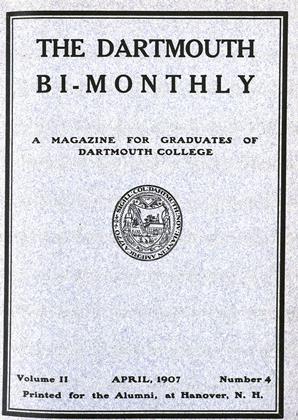The second annual meeting of the triangular debating league, composed of Dartmouth, Brown, and Williams, took place Monday evening, March 4, when Dartmouth debated Williams in Hanover and Brown in Providence; and Williams met Brown at Williams-town. Brown won from both Dartmouth and Williams, while Dartmouth defeated Williams. In each case the home team supported the affirmative of the following question: "Resolved, that armed intervention is unjustifiable on the part of any nation to collect in behalf of private individuals financial claims against any American nation."
The Hanover debate was held in Dartmouth Hall, Prof. Herbert D. Foster presiding. The Dartmouth speakers were: G. H. Howard '07, Craftsbury, Vt.; W. W. Shaw '10, Lowell ; and R. L Theller '09, Cambridge; the Williams speakers, N. L. Ernst '09, New York City; H. W. Toll '09, Denver; and J. K. Byard '08, Fly Creek, N. Y. The judges were: Professor Francis M. Burdick, dean of the Columbia Law School; Hamilton Holt, editor of The Independent, and Reverend Frederick Lynch, pastor of Plymouth Church, New York. The College orchestra furnished music.
Dartmouth's first speaker, Mr. Theller, argued that armed intervention for the purposes mentioned in the question is inconsistent with modern standards of civilization; that it violates that fundamental principle of international law which declares that all nations are free and equal; that it endangers the solvency and Credit of the debtor nation, and opens the door to the usurpation of territory, thus endangering the very existence of the state.
Mr. Ernst opened the debate for Williams by showing the condition of South America to be such that justice can not be obtained there. The political and judicial systems of South American nations, he declared, are corrupt beyond all imagination.
Dartmouth's second speaker,—Mr. Shaw, refuted Mr. Ernst's arguments, and declared that justice can be obtained in South America. Mr. Shaw further declared that armed intervention produces the very conditions complained of, and that it is injurious to debtors, creditors, and third parties.
Mr. Toll of Williams showed the characteristics of armed intervention, emphasizing especially the potential power which lies in the appearance of armored fleets. To take away armed intervention, he declared, would be to take away with it this beneficent effect of potentiality which holds South American nations to a sense of international duty.
The last affirmative speaker, Mr. Howard, maintained that every sovereignty has a right to choose its time and place of payment; that there are several efficient substitutes for armed intervention, as for instance mixed commissions, arbitration or receivership, now in use in San Domingo; he argued that the consequences of armed intervention outweighed in unjustifiability any justifiability that might attach to the private claim. The speaker closed with a summary of the affirmative's case.
Mr. Byard, the last speaker for Williams, argued that armed intervention must in all cases be the last resort,—that it must be the backbone of arbitration, that if a debtor nation is guilty of bad faith the use of arms in the collection of debt would be justifiable.
The decision of the judges in favor of Dartmouth was unanimous.
The speakers for Brown in Providence were: Zacharias Chaffee '07, Providence; George Hurley '07, Providence; and H. D. Bruce '07, Moretown, Vt.; and for Dartmouth: H. G. Kelly '07, Omaha; J. B. Brown 'O7, Everett; J. M. O'Neill '07, Canandaigua, N. Y.
The speakers for Williams at Williamstown were: Roy H. Chase, Canandaigua, N. Y.; George D. Carrington, New York City; and E. P. Groben, Buffalo; for Brown: R. N. Dennett, South Hadley, Mass.; D. N. Stone, Indianapolis, and C. R. Brance, Providence.
 View Full Issue
View Full Issue
More From This Issue
-
 Article
ArticleEDUCATIONAL REFORM IN CHINA
April 1907 By Charles D. Tenney, LL.D. -
 Article
ArticleBASEBALL
April 1907 -
 Article
ArticleTHE courtesy extended to the Dartmouth
April 1907 -
 Class Notes
Class NotesCLASS SECRETARIES
April 1907 By Kendall Banning -
 Class Notes
Class NotesCLASS OF 1878
April 1907 By Walter H. Small, EDMUND M. VITTUM -
 Article
ArticleDARTMOUTH'S CONTRIBUTION TO TEACHING
April 1907 By Walter H. Small
Article
-
 Article
ArticleImportant Trustee Meeting
April, 1911 -
 Article
ArticleAMERICAN UNIVERSITY UNION IN EUROPE
November 1917 -
 Article
ArticleThe College Gets a New Newspaper
SEPTEMBER 1983 -
 Article
ArticleNeither Snow, Nor Rain, Nor Heat
SEPTEMBER 1988 -
 Article
ArticleThe X Factor
Mar/Apr 2010 -
 Article
ArticleWhat the Workshops Meant
JUNE 1970 By GUY DE MALLAC-SAUZIER


